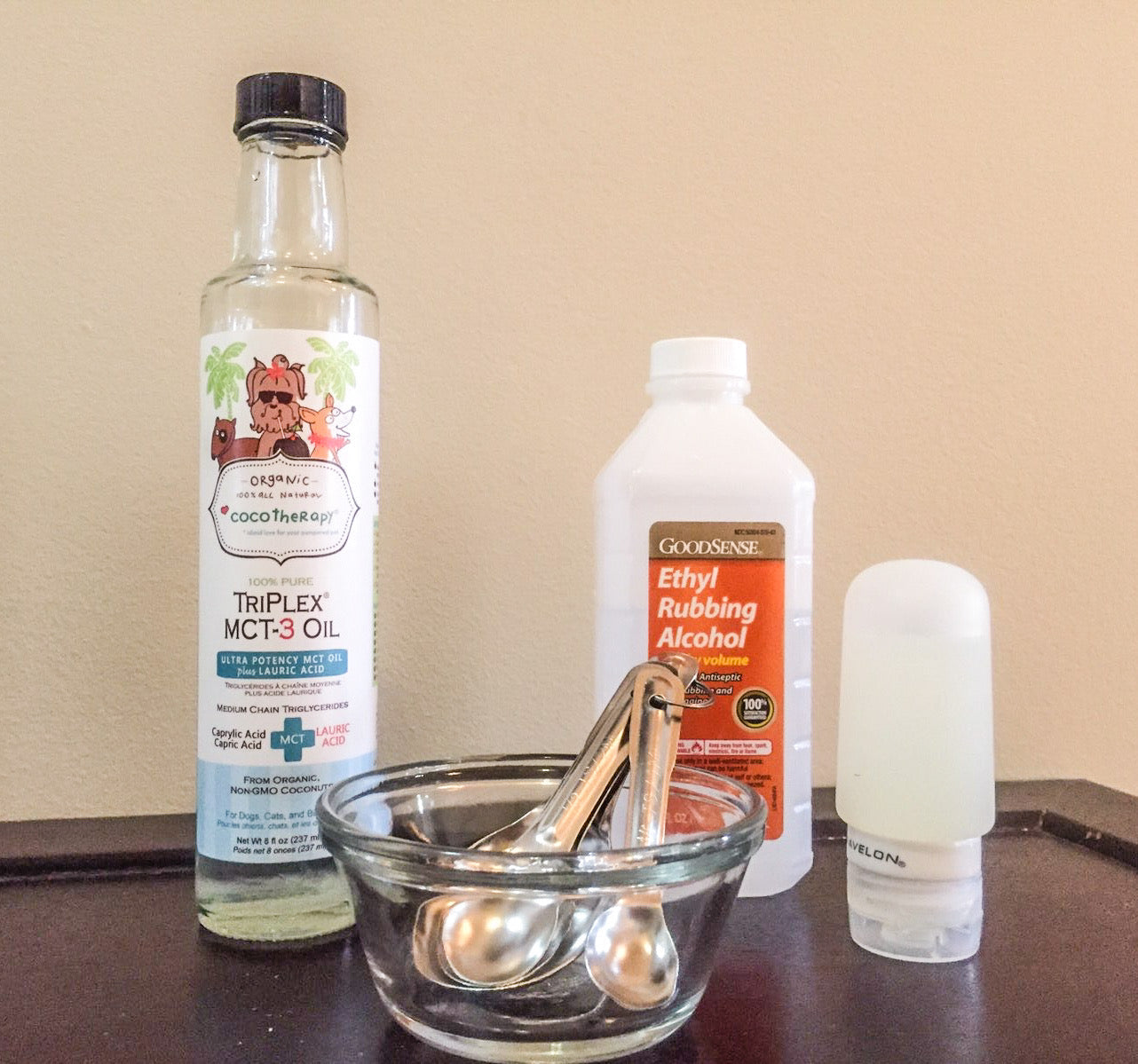In recent years, coconut oil has enjoyed a reputation as something of a superfood, and it seems that everyone wants to enjoy its much-touted anti-inflammatory benefits. Animal lovers are no different, and it has proven particularly popular among dog owners as a tasty treat to feed their loyal companions. But is it safe? Rumors are circulating that coconut oil could cause metabolic endotoxemia in your pup.
To find out the truth, let’s dive in and look at the science and facts behind coconut oil, metabolic endotoxemia, and dogs.

What is an Endotoxin?
Just like humans, dogs have naturally occurring gram-negative bacteria in their guts. They have the ability to eat raw meat and chew bacteria-laden old bones without getting sick. Bacteria in the microbiome are crucial for digestion and obtaining nutrients from the food your dog eats, as well as stimulating a normal immune response to protect dogs from an over-growth of harmful bacteria.
The cell wall or outer membrane of gram-negative bacteria contains lipopolysaccharide, or LPS. These LPS are also known as immune compounds, or endotoxins. All healthy animals have low levels of LPS in their blood. High levels of toxins or LPS in the blood is called endotoxemia.
Metabolic Endotoxemia and the Digestive System
A dog's gastrointestinal (GI) tract digests food, absorbs nutrients, makes vitamins, and protects the body from toxins and pathogens. It contains over 500 species of bacteria that make up what's known as the gut flora. The gut flora contains both beneficial good bacteria and gram-negative bad bacteria.
When the beneficial good bacteria are in balance with gram-negative bad bacteria, this makes it easier for the gut flora to do its job properly. This balanced state is called orthobiosis. Conversely, a state of imbalance – characterized by an overgrowth of parasitical or fungal organisms – can lead to dysbiosis.
So, what exactly is metabolic endotoxemia? It sounds like a mouthful, so let’s break down the words: metabolism refers to how the body takes food and turns it into energy and nutrition, while eliminating waste produced as a byproduct of this process.
As for endotoxemia: endo- is a prefix meaning within the body; tox- means toxins; and -emia means in the blood. So endotoxemia means toxins that are produced inside the body. Metabolic implies that they occur as a byproduct of metabolism that make it into the bloodstream.
Metabolic endotoxemia is the term used to describe an increased level of LPS in the bloodstream. Metabolic endotoxemia occurs when these levels are higher than normal.
But where does coconut oil come in? To answer that question, we need to look at how the body processes fats.
The Saturated Fat Confusion: LCFAs and MCFAs
In the same way the gut contains good and bad bacteria, there are different types of fat that can make metabolic endotoxemia more or less likely for dogs. The fats that cause the most confusion and controversy are saturated fats.
Remember those endotoxins (made from LPS) we learned about earlier? Studies have shown that in excessive amounts, long-chain fatty acids (LCFA) can increase the number of LPS in the blood. That's bad, but it doesn't mean that all saturated fats are bad. In fact, there's a specific type of saturated fat – one that often gets mistaken for the kind that could give your dog metabolic endotoxemia if they have too much of it – that's been scientifically proven to strengthen human and animal immune systems for decades. It's called a medium-chain fatty acid (MCFA).
It’s accepted scientific knowledge that mother’s milk in humans and mammals contain MCFAs, and it’s particularly rich in lauric acid. MCFAs have been shown to reduce inflammation in babies and pets. The good news? MCFAs are prevalent in coconut oil. World-renowned lipids expert Dr. Bruce Fife, ND, CN, has spent his entire career studying the effects of coconut oil in humans and animals. Here he explains more about the confusion over saturated fats, and the truth about the role coconut oil can play in keeping humans (and dogs) healthy:
"Some people in an attempt to cast criticism on saturated fats, have suggested that eating diets high in saturated fat promotes systemic inflammation leading to the development of obesity, diabetes, heart disease, and other disorders associated with chronic inflammation. They claim that saturated fat (particularly coconut oil or MCTs), is proinflammatory, and therefore, causes chronic inflammatory related disease. In their zeal to find reasons to condemn saturated fat and coconut oil, they overlook the obvious.
Fat has always been an important part of the human diet (and is essential for dogs and cats). Coconut oil and MCT oil are popular sources of fat in the high-fat ketogenic diet. Over the past century, thousands of people have embraced the ketogenic diet, some for extended periods lasting many years, and have not experienced obesity, diabetes, or heart disease. In fact, just the opposite happens; those on ketogenic diets generally lose excess weight, develop better blood sugar control, and reduce their risk of heart disease. The high saturated fat diet didn't harm them, but made them healthier. Instead of being inflammatory, coconut oil has been shown to calm inflammation. Despite it being composed of 92 percent saturated fat, numerous studies have demonstrated its anti-inflammatory effects."
The MCFAs in coconut oil actually train the immune system. But if MCFAs are so great for a dog's health, where does the idea that coconut oil might cause metabolic endotoxemia even come from?
LPS Released from LCFAs are Different from LPS from MCFAs
We know by now that high levels of LPS in the bloodstream are a metabolic endotoxemia danger sign. But scientific evidence has shown us that MCFAs (the natural anti-inflammatory fats in coconut oil) can also raise LPS levels. So, what's going on?
The crucial difference is the type of LPS that the MCFAs release. Because MCFAs kill harmful bacteria in the gut, although they still technically raise LPS levels, the LPS in this case are just fragments of dead bacteria. This means that the LPS absorbed after eating coconut oil will not cause chronic inflammation or promote inflammatory disease.
According to lipid expert, Dr. Bruce Fife states: the LPS that is absorbed after eating coconut oil does not produce a strong enough or long lasting enough immune response to cause chronic inflammation or promote inflammatory disease. It is chronic inflammation that leads to inflammatory disease, not transitory inflammation that the body uses to protect itself from infection.
A study published in the journal Lipids in Health and Disease titled “Postprandial serum endotoxin in healthy humans is modulated by dietary fat in a randomized, controlled, cross-over study,” investigated the inflammatory effect of LPS from coconut oil.[1] While the increase in blood LPS resulting from the ingestion of coconut oil does initiate an immune response, an increase in inflammation was undetectable. Therefore, coconut oil could not promote inflammatory diseases.
Lauric Acid Boosts the Body’s Immune System: Nature’s Perfect Design
MCFAs in virgin coconut oil are easy for dogs to digest, and will not cause them to suffer metabolic endotoxemia. Virgin Coconut oil is rich in an MCFA called lauric acid. Lauric acid kills gram-negative bacteria in the gut. The tiny fragments of the dead bacteria are then absorbed into the intestinal wall, where the immune system identifies the LPS as a threat, and issues a low-level response.
The body’s response to the fragments of dead bacteria is nature’s way of training the body’s immune response, thus strengthening the immune system against foreign microbes. Again, Dr. Bruce Fife again explains how it's all part of nature's perfect design:
"While coconut oil does raise LPS, it does not instigate a measurable rise in systemic inflammation and, therefore, does not contribute to inflammatory diseases. The LPS is from dead bacteria so there is no threat of an infection and no need for a robust inflammatory response. As I've said, absorbing LPS is not a disease or a mistake of nature, but part of the perfect design of nature.".
Virgin Coconut Oil is a Unique & Functional Fat
Simply adding virgin coconut oil as a fat supplement does not cause metabolic endotoxemia. The Bottom Line: The LPS released through the intestinal wall when consuming virgin coconut oil are fragments of dead bacteria. This is actually a healthy benefit of virgin coconut oil, not a harmful effect, as it stimulates the body’s immune system to respond. Virgin Coconut oil does not increase the levels of LPS to a level that causes metabolic endoxotemia. Low-grade inflammation (caused by a mild release of LPS) is not a disorder or a malady, it comes hand-in-hand with the destruction of all bad bacteria, which constitutes a whole eco-system of protection.
Your dog is constantly exposed to bacteria, viruses, and other daily toxins, all of which compromises the body’s immune system. Whether your dog is immune compromised or not, adding virgin coconut to your dog’s diet helps to support their overall health. It's a functional fat with many health benefits unique only to MCFAs and lauric acid.
In fact, its metabolic pathway (the way it's metabolized/processed in the body) and its chemical composition are so unique that it is well-tolerated by dogs with leaky gut, pancreatitis, protein losing enteropathy (PLE), and other lipid disorders. Furthermore, virgin coconut oil is recommended by veterinarians for dogs with any lipid intolerance or condition that require a "low-fat" diet.
Want to learn more about endotoxemia and the powerful health-promoting properties of coconut oil? Check out CocoTherapy CEO & co-founder, Charisa Antigua's in-depth interview with Dr. Bruce Fife.
[1] Lyte, JM, et al. Postprandial serum endotoxin in healthy humans is modulated by dietary fat in a randomized, controlled, cross-over study. Lipids Health Dis 2016;15:186
References
- Miura, S, et al. Modulation of intestinal immune system by dietary fat intake; relevance to Crohn’s disease. J Gastroenterol Hepatol 1998;13:1183-1190.
- Barbee, JF, et al. Apolipoproteins modulate the inflammatory response to lipopolysaccharide. J Endotoxin 2005:11:97-103.
- Level, JH, et al. The protective effect of serum lipoproteins against bacterial lipopolysaccharide. Eur Heart J 1993;14:125-129.
- Guo, L, et al. High density lipoprotein protects against polymicrobe-induced sepsis in mice. J Biol Chem 2013;288:17947-17953.
- Iribarren, C, et al. Cohort study of serum total cholesterol and in-hospital incidence of infectious diseases. Epidemiol Infect 1998;121:335-347.
- Ghoshal, S, et al. Chylomicrons promote intestinal absorption of lipopolysaccharides. J Lipid Res 2009;50:90-97.
- Ravin, HA, et al. On the absorption of bacterial endotoxin from the gastro-intestinal tract of the normal and shocked animal. J Exp Med 1960;112:783-792.
- Lyte, JM, et al. Postprandial serum endotoxin in healthy humans is modulated by dietary fat in a randomized, controlled, cross-over study. Lipids Health Dis 2016;15:186.
- Nadhazi, Z, et al. Plasma endotoxin level of healthy donors. Acta Microbial Immunol Hung 2002;49:151-157



